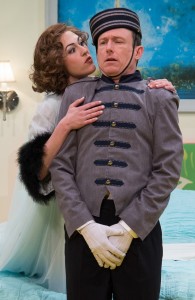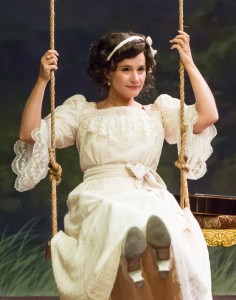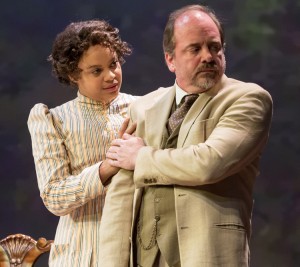Bess Wohl’s new comedy Make Believe portrays a quartet of Gen-X siblings at two points of life-changing family crisis. The first is in 1980, when the Conlees, two sisters and two brothers, are small children. The second is 32 years later. In both instances, the kids are gathered—it’s tempting to say “barricaded”—in a gargantuan nursery at the top of their parents’ luxe suburban home.
Peter Pan
The boy who wouldn’t grow up has become the character who won’t die. J.M. Barrie’s Peter Pan has been endlessly staged, filmed, remixed, twisted, and contorted since its 1904 premiere at the Duke of York’s Theatre, London, and the insatiable Pan pangs show no sign of ceasing. Bedlam’s current adaptation at another Duke, on 42nd Street, is the second Peter Pan–inspired show to run on the Deuce this season.
Vanity Fair
“This is not a moral place,” proclaims a master of ceremonies at the outset of the Pearl Theatre Company’s energetic Vanity Fair. “Nor is it often a merry one,” he adds, “for all of its pageantry and noise.”
The End of Days
Adam Bock’s rueful A Life covers both the title and its aftermath. It may borrow from—or perhaps merely echo—other plays, but in 80 minutes Bock conveys the fragility of mortality and the sadness of one person’s death in a deeply affecting way. Structurally, A Life is unusual. It begins with a long monologue, as David Hyde Pierce’s Nate, a middle-aged gay man, talks about his life, his ex-boyfriends, and his interest in astrology. The monologue lasts half an hour, and it may recall the tour de force that opens Tony Kushner’s Homebody/Kabul, although this monologue dovetails more organically into what follows.
Bock’s theme is virtually identical to that of A Delicate Ship (yet the result is more powerful), the Anna Ziegler drama staged by Playwrights Realm last season at Playwrights Horizons. That took its title from W.H. Auden’s poem Musée des Beaux Arts, as the Greek figure of Icarus falls from the sky into the ocean:
“The expensive delicate ship, that must have seen Something amazing, a boy falling out of the sky, Had somewhere to get to, and sailed calmly on."
The point of Auden’s poem is Bock’s too: no matter the gravity of one person’s death, life continues in its myriad small ways, even though they pale next to the end of an existence. In the half-hour opener, Hyde Pierce is able to connect deftly to his audience with the details of Nate’s past. Obviously famous from his work on television, Hyde Pierce is a consummately skilled stage actor as well. He has a wry comic delivery, sometimes self-deprecating, sometimes bewildered, accompanied by nods of the head, hangdog eyes, pauses, repetitions and grimaces, as he relates his early life in Pawtucket, R.I.; his friendship there with a woman who got him interested in astrology; and the string of boyfriends that he has had, many of whose names rhymed: Sean, John, Ron, Johan, Jan. Every moment feels lived in and true.
Hyde Pierce’s casual yet powerful performance ensures that we come to care about Nate before his life-ending event. (Alas, it’s impossible to discuss this play without this spoiler.) Some of his friends, he says, wonder why he never paired up with Curtis (Brad Heberlee), his longtime best friend, but it’s not in the cards, Nate says. Their bond is conveyed in a lovely scene as the two friends sit on a New York City park bench and watch muscular men jog by, trading amusing expressions of admiration and frustration.
As Nate returns home, he suffers a heart attack. What follows under Anne Kauffman’s superb direction is another extraordinary bit of stagecraft. For perhaps four minutes—an eternity in stage time—nothing moves and one hears only Mikhail Fiksel’s urban soundscape outside and registers the subtle lighting by Matt Frey that indicates the passage of time.
Two scenes then pick up the thread of Bock and Auden’s theme more directly. The mortician’s office arrives to collect Nate’s body while the stricken Curtis stands by, a bit bewildered as the mortician, Jocelyn (Marinda Anderson), takes a call on her cell phone. It seems inappropriate, but it’s also true: other lives continue in all their small, messy ways even as one life ends. There are even comic moments amid the tragedy, as Jocelyn persistently mishears the phone number Curtis is trying to give her, and they go back and forth trying to get it right.
In the following scene the drama literally stops, as it does in D.H. Lawrence’s The Daughter-in-Law after the husband comes home from the mines and washes up, drawing its power from the simplicity of action. On a gurney in the funeral home, Nate’s body is prepared, as Jocelyn and her assistant comb the hair, cut the nails, and glue the lips shut—while discussing family flare-ups and inconsequential bits of botany and biology. The effect is to set in relief, amid the mundane babble, the gravity of a life lost.
Bock’s final scenes follow Nate’s funeral, Curtis’s breakdown (Heberlee’s part isn’t flashy, but he inhabits it feelingly), a speech by Nate’s sister (Lynne McCollough, who is equally good as a mousy mortician’s assistant), and a voice-over (there have been some already) from Nate. The voice-over carries the promise of something beyond. It’s a graceful and powerful ending to a simple story, brilliantly staged and presented.
Playwrights Horizons (416 West 42nd St. between Ninth and Tenth avenues) is presenting Adam Bock's A Life through Dec 4. Evening performances are at 7:30 p.m. Tuesdays through Saturdays and at 7 p.m. on Sundays. Matinees are at 2:30 p.m. Saturday and Sunday. During Thanksgiving week (Nov. 21-27), the performance schedule will be Monday, Tuesday, Friday and Saturday at 7:30 p.m., and Wednesday, Saturday and Sunday at 2:30 p.m. Tickets are $59-$99 and may be purchased by phone at (212) 279-4200 or by visiting phnyc.org.
Vive ‘Le Dingdong’!
Director Hal Brooks unbridles five actors in The Dingdong, Mark Shanahan’s updated adaptation of Georges Feydeau’s 1896 farce Le Dindon. He propels it even further into the absurd by having those five actors bring to charming, boisterous and nuanced life 12 distinct characters.
The farce begins with Lucy Vatelin (Rachel Botchan), a married woman, attempting to slam the door on an overzealous suitor, Pontegnac (Bradford Cover). With Pontegnac’s arm and leg precariously lodged in the door, she is leaning against it, insisting he go away. “Everyone this side of the Seine heard you shout that you wanted to make passionate love to me!” she complains loudly, while screaming for her husband to save her. Unfortunately, Pontegnac is an old friend of her husband (Chris Mixon).
Lucy has another suitor, Redillon (Brad Heberlee), who calls on her as well. With Vatelin out of the room taking a business call, Redillon and Pontegnac square off. Meanwhile, Mme. Pontegnac (Kelley Curran), suspecting her husband's infidelity, has followed him to the Vatelins’ home, where Lucy, worn down, makes a pact with Pontegnac, agreeing to have an affair with him if her husband should ever be unfaithful. Pontegnac knows full well he hasn't been.
The first-act characters include Fabiola (also Curran) as Vatelin’s Italian lover, who has traveled to Paris (with her Hungarian husband) to find him and profess her love. The second act introduces even more, at The Hotel Ultimus, with doors slamming, a 17-year-old bellboy and a Parisian policeman (both played by Heberlee), luggage mix-ups, a French chambermaid, an old, practically deaf woman (Botchan) with uncontrollable flatulence, and a New Yorker named Mandy (Curran).
Two multifaceted performers capture the pure essence of farce in their multiple roles. Kelley Curran bursts onto the stage as the epitome of a sophisticated, bold Frenchwoman and shortly after reappears as an Italian lover with all the bravado of an early Sophia Loren. Act II opens with Curran as Mandy and, only to outdo herself, she closes the play as a fetching French maid. Wigs, costumes and shoes take an actor only so far in a role—Curran is each character.
Heberlee is also a delight, energetically embodying three characters—the flamboyant, sex-driven Redillon (who is a doppelgänger to Feydeau), the bellboy and the policeman. It is his role as Redillon in Act I, at one moment writhing on the floor and professing his love to Lucy, and in the next attempting to explain to Vatelin why he is on the floor (he is cleaning, after all) that is the most endearing. During the standoff with Pontegnac the actors pose like two preening cocks in the farmyard, arguing who is the greater lothario (“I would never discuss matters of intimacy with another man’s wife”).
Cover appears to have the most difficulty playing multiple characters, relying on his best Tim Conway impression, at times shuffling or gasping before each line. Act I finds him and Botchan in awkward and unnecessary movements with odd pacing.
Designing a 1938 French townhouse, Sandra Goldmark uses striking black and white striped walls, a sunrise-yellow floor, and tone-on-tone fabric chaises for Act I. Lighting designer Mike Inwood adds a wonderful layer of sunlight streaming through a lattice window. In Act II, at the Hotel Ultimus, there are bright green and yellow panels with a matching headboard and bedspread. A brief set change and the scene becomes the Honeymoon Suite of the Hotel Rue Cromartin, where the stagehands, decked out à la Marcel Marceau, replace the fabric with bright red floral patterns, as well as a painting of the Eiffel Tower.
Working in concert with the set designer, costumer Amy Clark mixes and matches contrasting colors and patterns. Her attention to detail with smart wigs and colorful hats, down to gartered socks and Redillon’s man-about-town look, is like pure icing on a Pimm’s Cup cupcake from Prohibition Bakery.
George Feydeau is one of the most famous writers of bedroom farce, and Mark Shanahan’s adaptation is a remarkable homage. Witty banter, along with exaggerated physicality, are at the heart of The Dingdong. Even the most pursed lip might be cajoled to laugh out loud.
Performances run through May 15 at the Pearl Theatre, 555 West 42nd St., (212) 563-9261. Tickets are $65 regular, $85 premium ($40 members, $20 student rush, $20 Thursday rush). Visit pearltheatre.org for specific dates and times.
Vanya @ 11th Avenue
The Pearl Theatre Company, which occupies a fine modern facility on West 42nd Street near 11th Avenue, has selected Anton Chekhov's Uncle Vanya, in a translation by the late Paul Schmidt, to open its 2014–15 season. Subtitled “Scenes from Country Life,” this comedy—or, rather, this special, melancholy kind of comedy—is one of four major plays the dramatist wrote near the end of his relatively short life.
The characters of Uncle Vanya are recognizable in their frustration and disappointment; their bickering and folly are readily believable. Though short on plot, the text is rich in dialogue and subtext. It's a beloved and influential play, constantly revived all over the world. Recent American works such as Vanya and Sonia and Masha and Spike by Christopher Durang (the most produced script in professional theaters around the U.S. this season, according to American Theater magazine) and The Country House by Donald Margulies (newly opened at Broadway's Friedman Theatre) owe it a conspicuous debt. When Uncle Vanya returns to New York, attention must be paid.
The play takes place on a country estate run by Sonya (Michelle Beck) and her maternal uncle (Chris Mixon), the title character. Sonya's father, Alexander Serebriakov (Dominic Cuskern), is a vainglorious scholar whose career and vitality are winding down. Serebriakov's luxurious city existence has been financed by the hard work and frugal living of Sonya and Vanya on the farm. Arriving in the country for an open-ended stay, the professor and his much younger wife, Yelena (Rachel Botchan), interrupt the rhythms of country life. Their selfish, inconsiderate ways exacerbate resentments that have festered in the family for years; and Yelena's flirtatious allure leads to intrigue (or attempts at intrigue) and emotional havoc among males in the vicinity, especially Vanya and a family friend, Dr. Astrov (Bradford Cover).
The Pearl's production, directed by company artistic director Hal Brooks, is exquisite to behold. With movable pillars and fast traveling curtains, scenic designer Jason Simms transports the action efficiently from one room to another. A backdrop in soft colors, revealed when actors sweep the upstage curtains aside, brings the Russian countryside on stage; and Seth Reiser's expertly modulated lighting lends a sense of time passing from day to night and back to day at a languid pace appropriate to Chekhov.
This Uncle Vanya has no shortage of capable actors. Robin Leslie Brown brings intelligence and a light touch to the role of Marina, the old nurse who soothes shattered nerves and offers a long view of life. Cover's interpretation of Dr. Astrov is complex and arresting; his speech about reforestation is appropriate to the play's 19th-century setting yet sounds like something that might have been delivered at United Nations Climate Summit 2014 last month.
Mixon makes Vanya's disillusion palpable in the first two acts; but he plays the late scenes in a manic fashion that's anathema to Chekhov’s subtle brand of comedy and, at times, reminiscent of 1970s television sitcom. Other promising performances—Beck, Brad Heberlee as a neighbor nicknamed Waffles, and Carol Schultz as the foolish mother of the professor’s deceased first wife—suffer from direction that squeezes a sort of hilarity out of the script rather than trusting the playwright’s rueful humor. Botchan strikes the appropriate balance of insouciance and formidable stage presence for her role; but this Yelena seems to have wandered onto the Pearl stage from a play of later vintage than Uncle Vanya and from a different country than the other characters.
For a number of years, the Pearl has been one of the few companies in New York City consistently performing the so-called classical repertory of Western drama. The troupe’s tagline is “defining classics for New York,” and its work, whether up or down, is worth following. Uncle Vanya doesn't represent the Pearl anywhere near the top of its form; but next month the company, in tandem with the Gingold Theatrical Group, will present George Bernard Shaw's Major Barbara, directed by David Staller. If Major Barbara has the style, pace, and Shavian spirit of last season's You Never Can Tell, audiences will undoubtedly forget the shortcomings of Uncle Vanya and may even line up to renew their Pearl subscriptions early.
Uncle Vanya is playing through Oct. 12 at the Pearl Theatre Co. (555 West 42nd St.). Running time 2 hours, 20 minutes with intermission. Performances are Tuesday at 7 p.m.; Wednesday, Saturday and Sunday at 2 p.m.; and Thursday–Saturday at 8 p.m. Tickets are $65, senior $39, student rush $20, Thursday rush $20, and may be purchased at pearltheatre.org or by calling 212-563-9261.
















